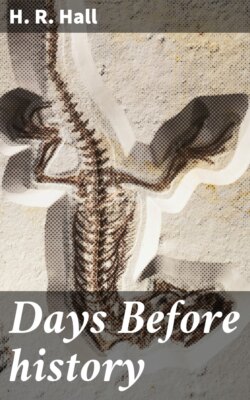Читать книгу Days Before history - H. R. Hall - Страница 3
На сайте Литреса книга снята с продажи.
Preface to the New Edition
ОглавлениеTable of Contents
IN a book of this kind nothing more will be expected than an outline sketch of some phases of the life lived by the prehistoric dwellers in our land. The known facts are few; yet there must have been, even in those far-away times, well-defined differences of habit and custom due to local circumstances; so that details more or less true of one tribe or group would possibly be quite untrue of others.
But, for all that, there are various conclusions upon which the learned may be considered to be in agreement; and, working from these and from the descriptions of primitive life in our own times, there is brought within our reach the possibility of constructing a picture of man in early Britain which, without leaving the lines of reasonable conjecture, need be neither meagre nor misleading.
An attempt has been made here to introduce only descriptions which can in some degree be vouched for; and as much of such authenticated detail as possible has been included. Some licence has been taken in bringing together events which in nature were, no doubt, separated by long intervals of time and space; in suggesting, for instance, that a man of the newer stone age might have heard some vague tradition of the makers of the old stone weapons, and yet, in his lifetime, have witnessed the incoming of the first weapons of bronze: yet, for the sake of picturesqueness, such licence may be considered to be not only permissible but, in a book with the purpose of this, actually desirable.
When first it was suggested to the writer that he should undertake this task, there was only one detail of the necessary equipment which he could feel to be his own—a childhood’s interest in the subject, never forgotten. There was the recollection of a chapter in an old lesson-book, much pored over, with its two or three simple woodcuts showing the skin-clad “ancient Briton” hollowing out his log canoe, or shooting at the deer in the forest. There was the memory of a reputed “British village,” with its pits and mounds, situated on a distant hill in the neighbourhood of his old home, often talked about, but too remote to be visited. There were recollections of a village philosopher, an amateur bird-stuffer and collector of fossils and antiquities, who carried in his purse and would show a treasure beyond gold, a barbed flint arrow-head. One he was who did not resent the companionship of an inquisitive little boy, but took him fishing and taught him something of the old country lore.
The road into fairyland lay open before that boy in his childhood. With home-made bow and arrows he stalked the deer on the open hill-side, or, armed with the deadly besom-stake for spear, tracked the wild boar to his lair among the whins. A running stream bounding the distant fields was for him a river to be forded with caution; the woodland pool was a forest lake, deep and mysterious; the grove of oaks on the hill-side was a woodland, and the more distant woods a forest vast and impenetrable.
And the skin-clad hunters of the bygone time peopled those hills and woods. The rabbits became red-deer, the hovering kestrel a flapping eagle, a chance fox galloping over the hill a ravening wolf, and the shy badger (only that one could never get more than the hearsay of him) a fierce old wild-boar. Then there were huts to be built, fires kindled, and weapons fashioned, marksmanship to be practised, hunting expeditions to be carried out, and ruthless warfare waged with unfriendly tribes.
Thus when the writer began the welcome task of setting down something about the life of a time so remote that only the indestructible fragments of its framework are now to be recovered, he had for his guidance these memories of childish games and wonderings; games that were never played out, and wonderings that have never been satisfied. And it was his hope that others, whether or not situated as fortunately as he once was, might perhaps catch a hint of the joy of playing the old games and following the old ways of life out-of-doors, as our forefathers followed them in the days before history. We have not all forgotten them yet.
A glance at the Contents will show that the chapters fall into two groups; those headed The Story of Tig, which are meant to be a story and nothing more; and those headed Dick and his Friends, which aim at explaining parts of the story and giving further details and comments from the standpoint of a later time. For anyone who finds these chapters dull, nothing is easier than to skip them.
A longish list might be made of the various books which have been read or consulted in the preparation of these chapters. They are all well-known standard books, such as would be readily found by anyone who might wish to follow the subject further. This edition includes six chapters that are new—numbers six, nine, and fifteen to eighteen—besides various paragraphs and oddments scattered throughout the book; the chapter-headings have been altered in most instances, and the illustrations are nearly all new.
The author wishes to offer his sincere thanks to Professor W. Boyd Dawkins, F.R.S., who generously consented to look over the proofs of the original book; and to Professor J. J. Findlay and Miss Maria E. Findlay for their invaluable help and kindly encouragement.
